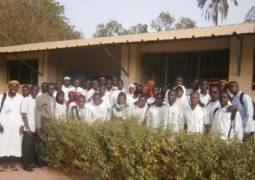Anti
Corruption Coalition (Gambia)
The
Gambia National Development Plan (2018 – 2021) was adopted in January, 2018 by
the Cabinet of HE Adama Barrow to create a system that delivers good governance
and accountability, ensure social cohesion, national reconciliation and a
revitalized and transformed economy for the wellbeing of all Gambians.
The
National Development Plan (NDP) emphasises well-known challenges such as
government measures to stabilize the economy, restore public confidence and
strengthen democratic institutions, provide greater clarity and focus for
government action, citizens’ engagement and provision of public service
delivery to last-mile population and sustainable development.
This
is in accordance with the national vision of an “integrated, prosperous and
peaceful new Gambia” that is enshrined in the NDP. The National Development
Plan also hopes to create an enabling environment for our private sector to
thrive and for citizens to enjoy quality standard of living and access to basic
services to enable them to lead decent and dignified lives. The national vision
also emphasises stabilizing the economy, stimulating growth and transforming
the economy.
However,
The Gambia is among the most corrupt countries and the NDP does not have
corruption and anticorruption provisions to promote integration of corruption
analytical findings, integrity in public accounting and public financial
management, strong oversight including holding duty
bearers accountable,efficient transparency mechanisms including access to
information, committed public servants with proven integrity, and guarantee
inclusion of civil society in an open governance system. According to
Transparency International - Corruption Perception Index (2018) and World Bank
on Control of Corruption (2017), The Gambia scored below 50 percent (37) and
score below 50 percent (-0.66) respectively.
These
rankings confirm the depth and scale of Gambia’s problem with corruption. So,
as Gambian companies find themselves trying to compete in deeply corrupt nation
state and the citizens struggling daily to access unequitable public services,
it’s understandable why the Barrow administration or others aspiring to one-day
rule the country would be reluctant to establish anti-corruption measures or
even dare to discuss their plansto mitigate corruption through analyses and
implement anti corruption through mechanisms. As far we at the coalition are
aware, none of the existing political parties have included corruption and anti
corruption plans per se in their manifestoes
Moreover,
local government and others within the establishments’ efforts to integrate
corruption and anti corruption in the system have lagged. The Government of The
Gambia is mandated within the provisions of the 1997 Constitution to establish
institutions were necessary and it is also mandated by United Nations
Convention Against Corruption, the AU Convention on Prevention of Corruption,
and the ECOWAS Protocol on illicit financial flow, to promote and encourage the
adoption of measures and actions by Gambia - as a signatory to the treaties
- to prevent, detect, sanction, and
integrate corruption and anti corruption measures to mitigate corruption risk
in all sectors of Gambian society. However, the Government of The Gambia have
recently announced that the long-awaited “Anti Corruption Bill” will be tabled
before the law makers before end of year 2019. The Anti Corruption Coalition
hopes that as soon as the “Bill” is tabled and passed into law, the
administration of President Barrow will also take immediate steps to table much
longer anticipated “Access to Information Bill” and then also should by
then start training competent and committed technical staff to be charged with
monitoring and implementing corruption and anti corruption procedures.
Although
the Government of The Gambia declared its intension to start doing something
about the “Anti-Corruption Bill”, there haven’t been any serious procedures
taken to take immediate steps to promote integration of corruption and anti
corruption measures needed to prepare the grounds for building strong
institutions through anti corruption oriented policies that should facilitate
the implementation of the “Anti Corruption Bill” when and if it becomes law.
Because
the political will to kick start integration processes of corruption and anti
corruption into the existing system seems lacking, many Gambia institutions,
the private sector and civil societies that are key players in any corruption
risk management have not put serious corruption and anti-corruption efforts on
the ongoing “National Policy Reform”.
The
Gambia NDP absolutely requires transformation of the very functions of dozens
different jobs within the establishment and the private sector to promote
corruption analyses and anti-corruption mechanisms applications such as
compliance audit, and performance audit to beef up the existing National Audit
efforts among others.
In
Gambia as it is in several African countries the public service and the private
sector simply do not have departments or positions to understand corruption
analyses and anti corruption mechanisms and to promote commitment of public
servants and business communities in provision of equitable access to public
service.
Until
now, the NDP is an excellent document that could boost transformation of the
national economy, stimulate growth and encourage participation of the citizens.
But it will be hampered by lack of proper corruption analyses and effective and
efficient anti corruption mechanisms well implemented by a committed public
servant if government do not take measures to begin integration of corruption
and anti corruption policies at all levels of the establishment.
It
is up to the Government of The Gambia to integrate robust corruption and
anti-corruption provisions in all the policy reform process and improve how it
monitors its institutions for the NDP to truly succeed.


